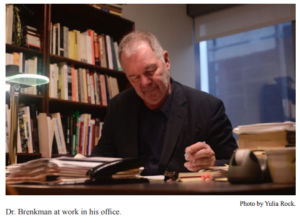Brenkman Explains the Art Behind Writing Novels
J.R.R. Tolkien, the famous author of The Lord of the Rings, once said that “Not all those who wander are lost,” and there are many examples of university professors who have tried different fields and have been able to shine in more than one of them.
That is the case with Dr. John Brenkman. Although he is an expert on novels, he began his career in a different field. “I probably had more emphasis on poetry and philosophy than I did on the novel,” says this native of Peoria, Illinois. “Then, sometime in the mid to late 80’s, I had a sense that things were happening in the contemporary novel that engaged our society in a new way, like the controversy over Rushdie’s The Satanic Verses, which became a global controversy about a novel, probably the most heated discussion of an unread novel in our history.”
He decided to read the novel and in the process developed a new interest. He said to himself: “Here’s a literary form that had such a direct and yet complex engagement with politics and with history and with the exact nature of society in given periods of time that it felt like a very compelling area to begin to reflect on, work on, teach in.”
This was a propitious turn of events for him, since he would later become a Distinguished Professor of English and Comparative Literature in the Weissman School of Arts and Sciences at Baruch College of the City University of New York.
Brenkman now can put things in a social context that others don’t see. “The novel has retained what I think of as a realist imperative—that is, an imperative to make reference to social reality, not necessarily to try and picture things just as they seem but to make reference to it.” And he sees that imperative operating not only in the American novel but also globally: “There was a sudden explosion and development of the novel among social groups or nations that had never had a novel tradition before and then suddenly wrote novels, and what they wrote about underwent such a massive change.”
Brenkman, who obtained his doctorate in Comparative Literature from the University of Iowa, thinks that, “because the novel is a storytelling form, the most immediate access that any writer has to stories that are already forming is to stories that are in some sense autobiographical.”
Yet he makes an important distinction. “Novels, even first-person novels, even novels where the facts are very similar to the life of the author, are not autobiographies; they’re novels.”
A good example of a novelist who used a lot of autobiographical material to write his novels is Herman Melville, who in his youth worked as a whaler and ended up writing what for many is the greatest piece of literature ever written on American soil: Moby Dick.
“He failed out of school to go sailing the world and wrote five absolutely successful novels. Then he reads Shakespeare, he shifts gears, and his next big project is Moby Dick, which did not sell and was critically panned. His next novel or two were also pretty much overlooked. I will say something that would be controversial to Melville specialists. I think he went from being a great modern novelist to a mediocre Victorian poet for several years.”
He recognizes Melville as a very courageous writer because of his innovation, and that may have been his downfall at the time. “That’s a problem and, of course, in the long run probably the most courageous will have been the most successful, but that’s hard to know in the moment,” says Brenkman, who knows how to put things in perspective.
“In marketing fiction, one must remember that there are many different kinds of fiction to write, and then there are the surprises—for example, the way in which an apparently very popular genre like noir fiction overtime becomes seen as an important contribution to literary history. But that tension between the commercial side of writing fiction and the aesthetic, artistic aspiration in writing fiction, that’s there from the very origins of the novel.”
In another of his wanderings, he published in 2007 a book entitled The Cultural Contradictions of Democracy: Political Thought Since September 11. Brenkman explains: “I had the opportunity to participate in a CUNY teaching exchange program, and I was teaching American literature at the University of Paris. This was the time of the budding crisis between Europe and the U.S. over the potential invasion of Iraq, and of course the September 11th attacks had occurred just a few months before.”
“It was a time when political issues, questions of foreign affairs, questions of the conflict between the U.S. and Europe were in the air,” continues Brenkman. “My own literary and intellectual formation is American with a strong European influence. I’d been working on a project, and I wanted to do a book that would be a series of essays on politics and the novel that would alternate a chapter on politics with a chapter on the novel, which would resonate with that chapter on politics.”
Then he had a change of heart. “I pulled the chapters on the novel and rethought the project in that context under the pressure of what was going on in those years as a question of how this new international circumstance of international terrorism, tensions between the U.S. and Europe, the debacle of the aftermath of the Iraq invasion—how does that all reflect back on the big guiding concepts in our tradition of political thought and political philosophy?” He concludes that “historical context illuminates the nature of modern democracy.”
PDF Version:
Brenkman Explains the Art Behind Writing Novels
